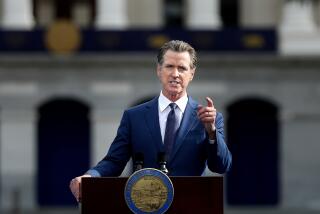Fed Chief Urges Study of Energy Alternatives
- Share via
WASHINGTON — The United States should explore ways to expand the use of nuclear power and coal energy, Federal Reserve Chairman Alan Greenspan told a congressional committee Tuesday.
But no matter how much the nation diversifies its sources, it will never be free of politically sensitive foreign suppliers such as the Middle East, Greenspan told the House Energy and Commerce Committee.
“I think we are committed irrevocably to a global economy,” Greenspan said at a committee hearing to address looming U.S. natural gas shortages. “I don’t think we have a choice but to deal in a global economy.”
The central bank chief said the United States should expand its ability to import liquefied natural gas from countries such as Algeria, Nigeria and Russia to create a “safety valve” that can stabilize natural gas prices, which are double year-ago levels.
Currently, there are only four liquefied natural gas terminals in operation in the United States.
Rep. Lois Capps, (D-Santa Barbara), said such a terminal planned for Oxnard has raised concerns about safety and effects on the environment, tourism and recreation. “There are associated costs” that must be considered, she said.
Greenspan acknowledged trade-offs when pursuing energy sources. “There is no way to create energy without risk,” he said.
He told the panel that high natural gas prices probably will last into 2004, and could weaken some key American industries’ ability to compete.
Industries that heavily rely on natural gas hope that prices will decline, but Greenspan said market signals suggest tight supplies and high prices would persist because -- unlike oil -- the U.S. gas market is unable to draw on world supplies easily to meet surges in demand.
“The markets are telling us that $2 gas is a historic relic -- at least for the time being,” Greenspan said.
Natural gas at wholesale has surged to $6.25 per thousand cubic feet, compared with an average of about $3 last year.
“We are not apt to return to earlier periods of relative abundance and low prices anytime soon,” Greenspan warned. He noted that the futures markets are anticipating natural gas prices of more than $6 per thousand cubic feet well into next year.
He stopped short, however, of suggesting that tight supplies, which have caused prices to more than double from last year, might thwart an economic recovery.
Congress should also look at ways to increase energy supplies from nuclear and coal, he said. The two sources together account for about 70% of U.S. supply.
“I think a major endeavor to examine this whole program is where we ought to be,” Greenspan said, referring to nuclear and coal industries. “At least look at it rather than dismissing it out of hand.” The U.S. has 103 nuclear power plants that produce about 20% of domestic energy supply. Some utilities have said they are considering seeking permits to build new plants, but optimism has been tempered by lingering national security and plant safety concerns.
No new U.S. nuclear plants have been built since the 1979 accident at Pennsylvania’s Three Mile Island plant, which had a partial meltdown of its reactor core.
Also Tuesday, the Senate rejected a Democratic attempt to strip from the energy bill about $10.5 billion in loan guarantees to encourage utilities to build new nuclear plants. The Senate is trying to finalize its version of a broad energy bill this week.
More to Read
Inside the business of entertainment
The Wide Shot brings you news, analysis and insights on everything from streaming wars to production — and what it all means for the future.
You may occasionally receive promotional content from the Los Angeles Times.










